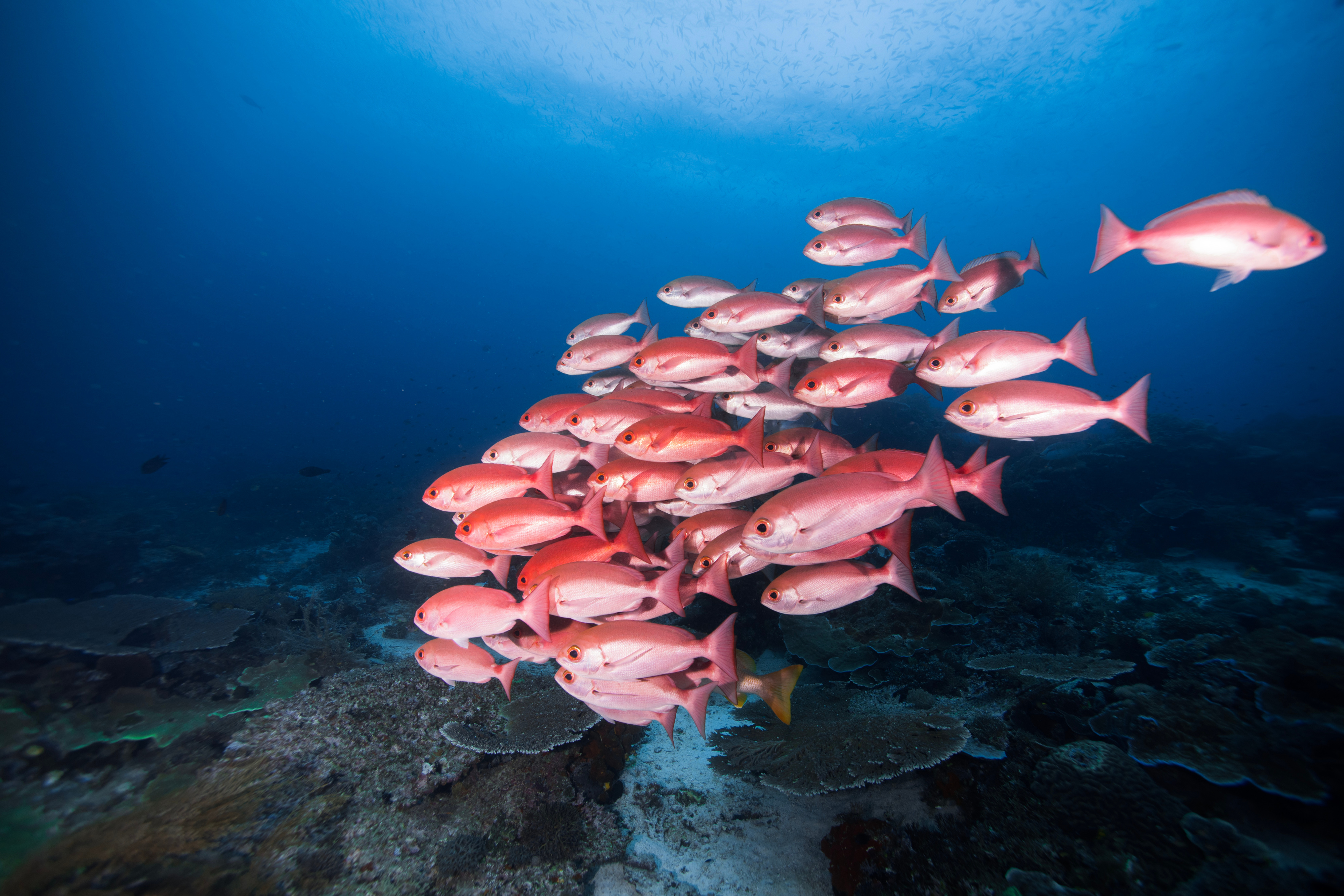
Mighty Earth’s Guide to Sustainable Fisheries in 2019

Last year, Mighty Earth, our allies, and environmental activists across the country successfully stopped a legislative effort to eviscerate the laws that have kept our oceans healthy. And it was a close call: special interest groups spent tremendous amounts of time and money lobbying Congress in favor of measures that would have thrown decades of smart fisheries management overboard.
Fortunately, thanks to organizing, advocacy, and the policy chops of a many stakeholders, we were able to protect the law that has successfully restored 45 fish stocks to healthy levels: the Magnuson-Stevens Act!
But the fight for healthy oceans must continue. With so many threats to our oceans, from plastic pollution to oil spills, we need support from private companies too. The task is simply too big and too important for these large companies to stay on the sidelines or, worse, exacerbate the problems we face.
Unfortunately, many companies involved in the fishing industry, like Yamaha, have stood in the way – despite having a vested interest in the health of our fisheries. Their continued success depends on abundant oceans, both now and in the future. Quite simply, they need fish for their customers to catch. Fortunately, we know how to protect the long-term viability of America’s oceans, and companies can get on board simply by supporting what we have been doing right for decades – upholding conservation-minded and science-based fishery management.
This week, Mighty Earth is releasing our “Principles for Fishery Management and Conservation.” This set of principles outlines the vision we have for continued sustainable fishery management around the country. We believe that fishery management should balance profitability with sustainability and that, in today’s world, we must address the worst effects of climate change, protect critical marine habitats and ecosystems, and hold everyone accountable to science-based conservation measures.
Companies can play a huge role in advancing policy; that’s why we’re asking them to sign on to these principles and be leaders on issues of sustainability, accountability, and transparency.
See below to read our principles:Mighty Earth Principles for Fishery Management and ConservationThe following principles drive Mighty Earth’s U.S. fishery conservation work. We envision a world in which our oceans are healthy and have thriving ecosystems; where we manage U.S. fisheries to meet the needs of both commercial and recreational anglers, while also conserving the resource for the future. With environmentalists, anglers, and business leaders working together, we can sustain our oceans ecosystems and fisheries for future generations.
Around the country, many stakeholders know the importance of keeping our oceans healthy for the long-term viability of our fisheries, the health of our planet, and the benefit of coastal communities. Thanks in large part to the success of the Magnuson-Stevens Fishery Conservation and Management Act (MSA), the U.S. has some of the most profitable and healthy fisheries in the world. Our management system — which has become a global model for sustainability — has curbed wide-spread overfishing, rebuilt 45 stocks to healthy levels, and is protecting the long-term viability of our fishery resources.
It is essential that we maintain the science-based management requirements of the MSA to ensure that we continue to be a global leader for sustainability, conservation, and science-based fishery management. Below are a set of principles that Mighty Earth believes to be core considerations for federal fisheries policy and management.Conservation and SustainabilityUpholding Annual Catch Limits: One of the most critical tools to promote sustainability under the MSA is science-based annual catch limits (ACLs). ACLs assist fishery managers in ensuring that the number of fish caught is sustainable and will not adversely affect the health of the stock. ACLs prevent overfishing and rebuild overfished stocks while ensuring that the United States maintains a safe and sustainable supply of seafood. ACLs under the MSA have been remarkably successful. Science-based ACL requirements must remain strong to maintain balanced and healthy oceans for generations to come.
Maintaining Rebuilding Requirements: Rebuilding requirements under the MSA require that overfished stocks be rebuilt as quickly as possible, in a period not to exceed 10 years, unless certain conditions apply. These requirements are critical to the long-term sustainability of our fisheries. Fishery management legislation should not seek to extend these important timeframes, or allow any deviations from current rebuilding timelines, other than those in current law. Proposals to allow exemptions from the law’s rebuilding timelines threaten the progress we have made towards restoring our fisheries to healthy levels.
Protection of Marine Habitats: Fishery management must be implemented in a way that actively improves the sustainability of our fisheries by ensuring more protection of marine habitat, especially habitat that is critical for rebuilding and protecting fish stocks. As our oceans face ongoing environmental threats, it is critical that we protect threatened marine areas so that ecosystems can rebuild and thrive.Advances in Science and TechnologyEnsuring the Use of Best Available Scientific Information: Undoubtedly, scientists must continuously improve data collection to monitor our fisheries. However, fisheries management cannot wait, and the law is clear about the standard for data that must be used. We must work to improve our data while simultaneously using the best available scientific information, as outlined in the MSA, to make educated decisions.
Climate Resiliency: We can and must learn how to better adapt the management of our fisheries to changes in our oceans due to rising temperatures and ocean acidification that cause stock migration, habitat loss, and stress on fish populations.Shared Accountability and ResponsibilityEnsuring Equitable Responsibility: No matter who catches a fish, everyone must be held accountable to the science-based management requirements and conservation measures in the MSA that have kept our oceans and fish stocks healthy. Accountability means that there must be fair enforcement of the law across communities that utilize our fisheries, and that there must be corrective action when overfishing occurs.
Reducing Bycatch: Anglers must be held accountable for, help gather data on, and reduce the amount of bycatch that results from their fishing. It is critical that the amount of bycatch that results from both recreational and commercial fishing, regardless of whether it is part of catch and release fishing, be accurately accounted for so that data can be used to reduce bycatch.
Corporate Responsibility to Shareholders: As a part of their fiscal responsibility, companies must consider the long-term impacts of their legislative priorities. By promoting conservation over short-term profits, companies can assure their shareholders that they are working in their best interest by supporting legislation that will allow their business to thrive in the future, and by boosting their brand as a sustainable company.
Transparency: Corporations should disclose the legislative measures they support, whether directly through their own company or indirectly through financial contributions to other organizations. Companies should also strive to reduce conflicts of interest when it comes to their involvement in fisheries management by disclosing their financial interests and board or council memberships.
Responsibility to Consumers: We believe in corporate responsibility; it is necessary for companies to do right by their consumers and the planet by prioritizing conservation and sustainability alongside their profits. Consumers want to see the companies they buy from on the right side of conservation. So often, corporations have an opportunity to be the biggest drivers of environmental change and can be leaders amongst their peers by taking steps to protect our planet. In this case we know that healthy fisheries mean healthy oceans and that corporations have an opportunity to speak out to protect both for future generations.[vc_separator]We therefore ask companies to embrace corporate responsibility by disclosing their lobbying and committing to only supporting policy that:
- Maintains a commitment to science-based measures, including annual catch limits and rebuilding requirements, that keep fish stocks at healthy levels and rebuild depleted stocks;
- Recognizes the importance of accountability across sectors to keep our oceans healthy. We must acknowledge that everyone has a role to play in maintaining the delicate balance of conservation and access to our oceans’ resources, as well as reducing harm to our fish stocks and other marine creatures; and
- Takes into account the impact of climate change and ocean acidification on our oceans and seeks to foster increased resilience and adaptability of fish stocks and ocean habitats with regards to these impacts. This can be done in part by advancing the science of climate resiliency and protecting marine areas in a changing climate.


